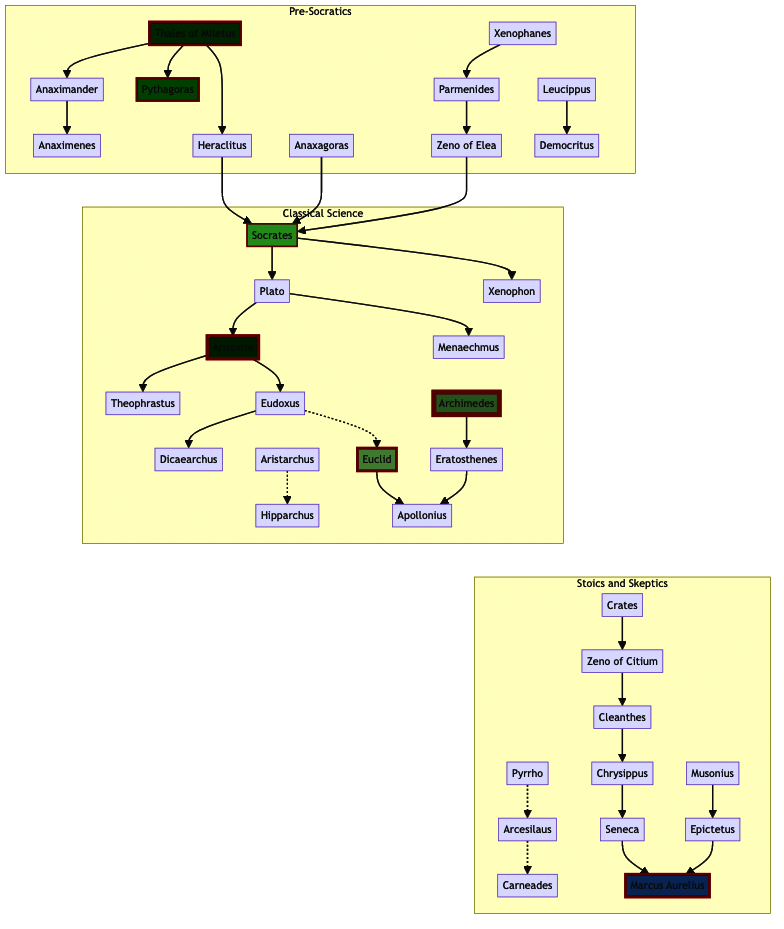
1. Pre-Socratics (Natural Philosophers)
-
624–546 BCE: Thales of Miletus — Water as fundamental substance; founder of Greek science; Milesian school.
-
610–546 BCE: Anaximander of Miletus — Introduced the "apeiron" (infinite or boundless); student of Thales.
-
586–526 BCE: Anaximenes of Miletus — Air as primary substance; refined Thales’ ideas.
-
570–495 BCE: Pythagoras of Samos — Mathematical harmony of cosmos; number theory; early influence on Plato.
-
570–478 BCE: Xenophanes of Colophon — Critic of anthropomorphic gods; early monotheistic themes.
-
535–475 BCE: Heraclitus of Ephesus — "Everything flows" (panta rhei); logos; fire as base element.
-
515–450 BCE: Parmenides of Elea — "Being is"; change is illusion; foundational metaphysics.
-
490–430 BCE: Zeno of Elea — Paradoxes of motion and plurality; defender of Parmenidean logic.
-
494–434 BCE: Empedocles of Akragas — Four classical elements; cosmic forces of Love and Strife.
-
500–428 BCE: Anaxagoras of Clazomenae — Nous (Mind) as organizing principle of cosmos; mentor to Pericles.
-
5th c. BCE: Leucippus of Miletus — Co-founder of atomism with Democritus.
-
460–370 BCE: Democritus of Abdera — Atomic theory; matter as indivisible particles in the void.
2. Classical Period (Socratic and Scientific)
-
470–399 BCE: Socrates of Athens — Dialogical method; ethics and virtue; “Know thyself”; left no writings.
-
430–354 BCE: Xenophon of Athens — Student of Socrates; practical Socratic accounts in Memorabilia.
-
428–348 BCE: Plato of Athens — Theory of Forms; The Republic; founded the Academy.
-
436–338 BCE: Isocrates of Athens — Orator and educator; rival educational vision to Plato’s.
-
384–322 BCE: Aristotle of Stagira — Logic, biology, metaphysics; founded the Lyceum.
-
371–287 BCE: Theophrastus of Eresos — Aristotle’s successor; work in botany and logic.
-
387–312 BCE: Menaechmus of Alopeconnesus — Conic sections; influence on Apollonius.
-
370–285 BCE: Eudoxus of Cnidus — Theory of proportion; model of planetary motion.
-
360–290 BCE: Dicaearchus of Messana — Geographer and student of Aristotle.
-
330–275 BCE: Euclid of Alexandria — Father of geometry; Elements as foundation of axiomatic method.
-
310–230 BCE: Aristarchus of Samos — Heliocentric theory; early astronomical model.
-
287–212 BCE: Archimedes of Syracuse — Mechanics, hydrostatics, geometry; inventor and physicist.
-
276–194 BCE: Eratosthenes of Cyrene — Calculated Earth’s circumference; geography and chronology.
-
240–190 BCE: Apollonius of Perga — Formalized conics; advanced Greek geometry.
-
190–120 BCE: Hipparchus of Nicaea — Trigonometry; star catalog; precession of equinoxes.
3. Hellenistic Period (Stoic and Skeptical Schools)
-
334–262 BCE: Zeno of Citium — Founder of Stoicism; emphasized virtue and rational living.
-
330–230 BCE: Cleanthes of Assos — Second head of the Stoa; author of Hymn to Zeus.
-
280–206 BCE: Chrysippus of Soloi — Codified Stoic logic, ethics, and physics; most prolific Stoic.
-
341–270 BCE: Epicurus of Samos — Founded Epicureanism; pleasure through ataraxia (tranquility).
-
360–270 BCE: Pyrrho of Elis — Founder of Pyrrhonian Skepticism; suspended judgment (epoché).
-
316–241 BCE: Arcesilaus of Pitane — Turned Plato’s Academy toward Skepticism.
-
214–129 BCE: Carneades of Cyrene — Argued both sides of issues; Academic Skeptic.
4. Roman Stoics
-
4 BCE – 65 CE: Seneca of Corduba — Statesman and dramatist; applied Stoicism to practical life.
-
30–100 CE: Musonius Rufus of Volsinii — Teacher of Epictetus; emphasized equality and endurance.
-
50–135 CE: Epictetus of Hierapolis — Former slave; taught inner freedom through reason.
-
121–180 CE: Marcus Aurelius of Rome — Roman emperor; Meditations on duty, virtue, and resilience.
5. Legacy Summary
-
Pre-Socratics: Introduced rational inquiry into nature and metaphysical being.
-
Socratics: Ethics and dialectical methods as a foundation for personal and civic virtue.
-
Plato → Aristotle: Core of Western logic, metaphysics, political theory, and natural science.
-
Hellenistic Science: Formal geometry, astronomy, physics, medicine, and geography.
-
Stoics: Lasting influence on ethics, modern CBT, self-mastery, and resilience philosophy.
-
Skeptics & Epicureans: Alternative Hellenistic schools emphasizing doubt, tranquility, and pleasure.
